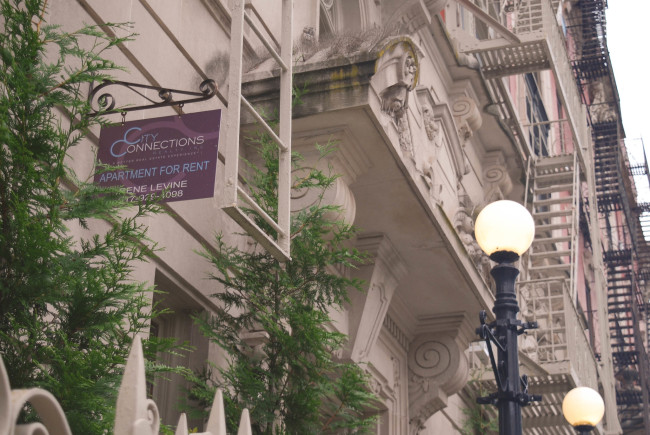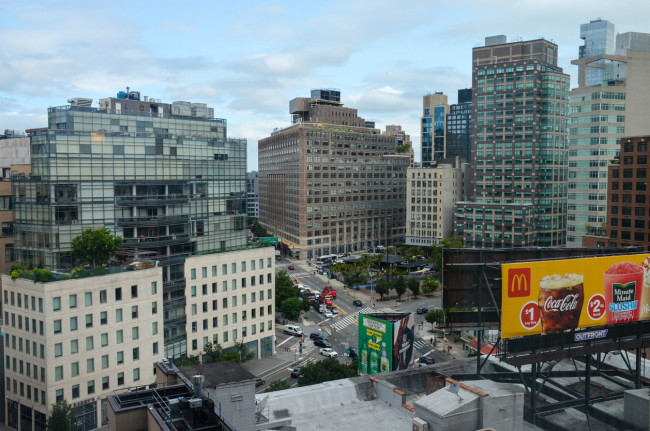City Council bill to shift broker fees to landlords unlikely to pass this year
- Unlike other cities, NYC renters have to cover a broker’s fee regardless of who does the hiring
- Council member Chi Ossé discusses his bill, which faced similar opposition to prior efforts to limit fees

Ossé plans to reintroduce his legislation in 2024.
iStock
Keep your checkbooks open. That's the message for New York City renters who will still bear the burden of paying a landlord’s broker’s fee, at least this year, according to the city council member who this summer tried to change who covers the fee.
Council member Chi Ossé, who represents Bedford-Stuyvesant and North Crown Heights in Brooklyn, introduced a bill in June that would require whoever hired the broker to pay their fee. But even after the bill gained the support of the majority of the council members, it’s unlikely to come to a vote this year, Ossé says. Better luck in 2024, folks.
“From what I think is going to happen, it’s not going to pass this session,” Ossé says. “[But] we're hoping to have a lot of support from our partners and labor, as well as more council members who will hopefully sign on, especially those who are dealing with tough elections [next year].”
Renting an apartment in NYC can feel a lot like a bidding war—especially when it comes to rent-stabilized units. That’s because renters are often on the hook for the broker fee, regardless of who hired the broker. In competitive markets like the current one, brokers can ask for thousands of dollars for access to some of the city’s most desirable apartments, including affordable housing, though brokers traditionally ask for 12 to 15 percent of the annual rent.
Sky-high fees have helped raise awareness of NYC’s unique broker fee system, but it’s not the first time someone’s tried to change it.
Legislation proposed in 2019 attempted to cap broker fees at one month’s rent, though the law was struck down in court. The New York Department of State briefly blocked renter-paid broker fees in early 2020 under its interpretation of the 2019 Housing Stability and Tenant Protection Act, but a subsequent lawsuit from the Real Estate Board of New York (REBNY) changed its guidance.
Ossé’s bill, dubbed the Fairness in Apartment Rental Expenses Act, has faced similar opposition from REBNY. The organization has campaigned to block the proposed change, arguing it would cut into brokers’ pay and force landlords to shift the cost of the fees onto tenants through permanent rent increases.
“I think everyone acknowledges that we want to alleviate housing costs, but this bill would actually go in the opposite direction and exacerbate costs to renters,” says Ryan Monell, vice president of governtment affairs at REBNY. “When you speak to those who understand the market—like agents and owners—they tell you this is not what would actually benefit the New York housing market.”
REBNY reportedly struck a deal with council member Marjorie Velazquez to block the bill, and the organization raised $11,500 for her during Velazquez’s reelection campaign this summer, the New York Daily News reported. Monell said REBNY has spoken with all council members about the FARE Act, and denied any specific arrangement with Velazquez. She chairs the Consumer and Worker Protection Committee, and told the Daily News that she would not bring the FARE act to a hearing this year. A spokesperson for Velazquez did not immediately respond to requests for comment.
With the bill now frozen, Brick sat down with Ossé to talk about what he hopes to achieve in 2024.
Brick Underground: Do you rent or own in the city? What’s your personal experience with broker fees?
Chi Ossé: I'm a renter in New York. In April of this year, I was looking for my first official apartment as a New Yorker. I was running into so many ruts in terms of how expensive it was, how difficult it was, and then also confronted with having to pay a broker fee.
I actually worked with a broker to find an apartment that I thought I deserved. But just because I paid a broker fee, doesn't mean that anybody should be forced to pay [one].
How much did your broker fee end up being, for the person you hired?
It was $2,500. It was a little over a month’s rent.
Why did you introduce the Fairness in Apartment Rental Expenses act? What do you hope it achieves?
I'm trying to bring NYC up to date to how every other city’s broker system works.
I hate our housing crisis. I hate what it's doing to my constituents, to my friends, to my neighbors, and to my loved ones. It's so difficult to find an apartment. And one of the obstacles that many tenants encounter is having to pay a broker fee to someone that they did not negotiate a price with, did not hire themselves, [and] someone who their landlord is basically getting a free service from.
I know there were some attempts that were made in the past. But I really wanted to introduce a very common sense piece of legislation that would require whoever hires the broker to pay the broker fee, whether they were the tenant or the landlord.
You mentioned the previous attempts. Do you think this new push will work? How does this differ from the 2019 attempt?
[People] have tried to eliminate broker fees as a whole. They’ve tried to cap how much brokers can charge for these fees. We're not doing anything around that. We're not infringing on the marketability of broker fees.
What we're basically doing is protecting the consumer and protecting the free market. I'm making sure that the way that we have this broker system set up in New York mimics every other way that we do transactions within our economy. If you ordered something, if you hired some[one], you negotiated a price for something, [then] you pay it.
So that's the difference between this bill compared to some of the other things in the past. And that's why I believe that we got a majority of supporters in the city council to sign on to this—29 to 51. This is the closest we've ever been to passing something like this. And I think it's because it's so common sense.
Is it going to make it out of the Consumer and Worker Protection committee? What are the next steps?
It has to come to a committee hearing, and from what I’ve heard, there’s not enough time in this year for this to come to a hearing and a vote. It’s a very controversial bill, so from what I think is going to happen, it’s not going to pass this session. But it may be introduced next session.
Are you planning on reintroducing it next year?
Yes, absolutely. And we're hoping to have a lot of support from our partners and labor, as well as more council members who will hopefully sign on, especially those who are dealing with tough elections.
And you haven’t had a hearing or a vote on it yet in the committee?
[No.] The hearing is the bare minimum. Every bill should have a hearing, especially if it's as large as this. This is when bills get to hear from the public, and they can change through public input. It's one of the core tenets of democracy for bills to be spoken about through the public's voice.
If it does pass next year, do you expect it to have any impact on rents in the city? For example, will landlords raise rents to cover the fee? Are there any other consequences we might see?
Those are things that we've thought through. First of all, nearly 50 percent of tenants in New York City live in rent stabilized units. For a landlord of these stabilized units, it would be illegal for them to pass on the rents to those units because [their rents] only change through the Rent Guidelines Board.
Many tenants would rather pay their broker fee spread over 12 or 24 months rather than having to pay it upfront. When you think about people in hard situations, the thing that's really holding them back from moving into an apartment is having to save [money] just to move. If that broker fee is spread out over 12 or 24 months, [that] makes the process a lot easier.
The last thing I'll say is that if landlords could charge more than they already do, they would. They're not holding back at all.
Some of the highest broker fees we've seen at Brick are on rent-stabilized apartments. For example, we saw a $7,500 fee on an apartment for around $2,405 a month. How would this impact rent-stabilized renters being asked to pay a fee?
The landlord would have to pay it essentially, if that's the broker’s price. But if a tenant has the option whether to have a broker or not, then it’s up to the tenant on whether they pay that fee or not. Because of that change, we would expect to see that price come down, especially if a landlord decides to list an apartment themselves.
Do you think this would have an impact on fees paid by the landlord? Do you think landlords would pressure brokers to lower fees at all?
I think that could be expected. That’s not as much my worry. I think that our intention with this bill is really just trying to make sure that you pay for what you buy. And how the market responds to that is how the market will respond.
I think that a lot of the fear around this decimating the industry is a fear tactic. We can point to every other city where they are not as archaic as how we do this in New York, and you can still see that a broker economy exists.
In terms of the timeline, if you were to reintroduce this next year, when would it possibly have an impact?
I believe it would be [in] early 2025. Hopefully we're going to pass this next year and we would see it come into fruition in 2025. And [depending on] my negotiations with the administration, as well as city agencies, we could definitely advocate for this to be implemented earlier and come into effect a lot earlier. But that's a different process than getting this passed.
I hope it comes into fruition. I’m not going to give up on faith but there’s a lot of powers that don’t want this to pass.



























